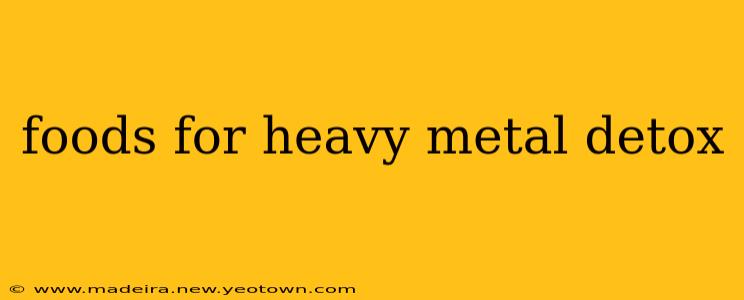Foods for Heavy Metal Detox: A Journey to Wellness
Our bodies are amazing machines, constantly working to maintain balance. But sometimes, we face unseen challenges, like the accumulation of heavy metals. These toxic substances, from environmental exposure to contaminated food, can disrupt our health in subtle and significant ways. While medical intervention might be necessary in severe cases, incorporating specific foods into your diet can significantly support your body's natural detoxification processes. Let’s embark on a journey to explore the power of food in heavy metal detoxification.
This isn't about a quick fix; it's about a holistic approach to wellness. Think of it as nurturing your body's innate ability to cleanse itself. This journey requires patience and consistency, but the rewards—improved energy, better cognitive function, and a stronger immune system—are well worth the effort.
What are Heavy Metals and Why Detox?
Heavy metals, such as mercury, lead, cadmium, and arsenic, are toxic elements that can accumulate in our bodies over time. Exposure can happen through various sources: contaminated water, air pollution, certain foods, and even some consumer products. These metals can interfere with essential bodily functions, leading to a range of health issues, from fatigue and headaches to more serious neurological problems. Detoxification aims to support the body's natural mechanisms for eliminating these toxins. This is not a cure-all, and professional medical advice is crucial for individuals with significant heavy metal burdens.
What Foods Help with Heavy Metal Detox?
Several foods are known for their ability to assist the body in removing heavy metals. These aren't miracle cures, but rather supportive elements in a comprehensive approach.
1. Cilantro: This vibrant herb has been used for centuries in traditional medicine, and research suggests it may help bind to heavy metals, aiding in their excretion. Adding cilantro to your meals, from salsas to soups, is a delicious and effective way to incorporate it into your diet.
2. Chlorella: This single-celled green alga is a nutritional powerhouse, rich in chlorophyll and other beneficial compounds. Studies have shown its potential to chelate (bind to) heavy metals, helping to remove them from the body. You can find chlorella in supplement form or incorporate it into smoothies.
3. Spirulina: Another type of blue-green algae, spirulina is packed with nutrients and antioxidants. It's also shown promise in supporting heavy metal detoxification, similar to chlorella. It can be added to smoothies, juices, or taken as a supplement.
4. Garlic: Known for its pungent flavor, garlic contains compounds with potent antioxidant and detoxifying properties. It is believed to support the liver's function in eliminating toxins, including heavy metals.
5. Lemon: The high vitamin C content in lemons helps boost the immune system and support the liver's detoxification processes. Adding lemon to your water or using it in cooking provides a simple and effective way to incorporate this benefit.
6. Kelp: This seaweed is rich in minerals and alginate, a compound that can bind to heavy metals. It's best to purchase kelp from reputable sources due to concerns about potential contamination.
7. L-Glutathione: While not strictly a food, L-glutathione is a potent antioxidant produced naturally by the body. It plays a crucial role in liver detoxification and can help neutralize the effects of heavy metals. Foods rich in precursors to glutathione (cysteine, glycine and glutamate) such as cruciferous vegetables, avocados and meats may help support the body's production of glutathione.
How Long Does it Take to Detox from Heavy Metals?
There's no one-size-fits-all answer to this question. The duration of heavy metal detoxification depends on several factors, including the type and amount of metals accumulated, individual metabolism, and the overall approach to detoxification. The process is gradual and requires patience and consistency.
What are the Signs of Heavy Metal Toxicity?
Symptoms can vary widely, ranging from fatigue and headaches to neurological issues and digestive problems. If you suspect heavy metal toxicity, it's crucial to consult a healthcare professional for accurate diagnosis and treatment.
Are there any risks associated with heavy metal detox?
Yes, there can be risks. Some detox methods can be harmful if not done correctly under the supervision of a health professional. Improper detox can lead to imbalances in essential minerals and other health complications. Always consult with a medical doctor before starting any detoxification program, especially if you have pre-existing health conditions.
This information is for educational purposes only and should not be considered medical advice. Always consult with a healthcare professional before making any changes to your diet or treatment plan, particularly if you suspect heavy metal toxicity. A holistic approach to wellness, combining dietary changes with professional guidance, offers the best chance for successful detoxification and improved overall health.

